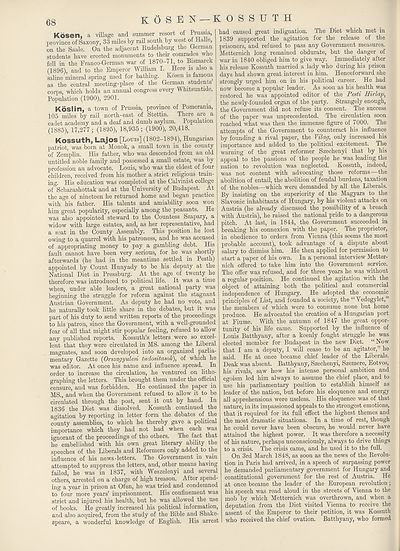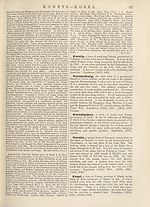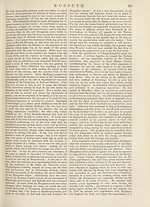New volumes of the Encyclopædia Britannica > Volume 30, K-MOR
(90) Page 68
Download files
Complete book:
Individual page:
Thumbnail gallery: Grid view | List view

68 K 0 S E N —
Kosen, a village and summer resort of Prussia,
province of Saxony, 33 miles by rail south by west of Halle,
on the Saale. On the adjacent Pudelsburg the German
students have erected monuments to their comrades who
fell in the Franco-German war of 1870-71, to Bismarck
(1896), and to the Emperor William I. Here is also a
saline mineral spring used for bathing. Kbsen is famous
as the central meeting-place of the German students
corps, which holds an annual congress every Whitsuntide.
Population (1900), 2901.
Koslin, a town of Prussia, province of Pomerania,
105 miles by rail north-east of Stettin. There are a
cadet academy and a deaf and dumb asylum. Population
(1885), 17,277 ; (1895), 18,935; (1900), 20,418.
Kossuth, Lajos [Louis] (1802-1894), Hungarian
patriot, was born at Monok, a small town in the county
of Zemplin. His father, who was descended from an old
untitled noble family and possessed a small estate, was by
profession an advocate. Louis, who was the eldest of four
children, received from his mother a strict religious train¬
ing. His education was completed at the Calvinist college
of Scharashottak and at the University of Budapest. At
the age of nineteen he returned home and began practice
with his father. His talents and amiability soon won
him great popularity, especially among the peasants. He
was also appointed steward to the Countess Szapary, a
widow with large estates, and, as her representative, had
a seat in the County Assembly. This position he lost
owing to a quarrel with his patroness, and he was accused
of appropriating money to pay a gambling debt. His
fault cannot have been very serious, for he was shortly
afterwards (he had in the meantime settled in Pesth)
appointed by Count Hunyady to be his deputy at the
National Diet in Pressburg. At the age of twenty he
therefore was introduced to political life. It was a time
when, under able leaders, a great national party was
beginning the struggle for reform against the stagnant
Austrian Government. As deputy he had no vote, and
he naturally took little share in the debates, but it was
part of his duty to send written reports of the proceedings
to his patron, since the Government, with a well-grounded
fear of all that might stir popular feeling, refused to allow
any published reports. Kossuth’s letters were so excel¬
lent that they were circulated in MS. among the Liberal
magnates, and soon developed into an organized parlia¬
mentary Gazette (Orszagyulesi tudositasok), of which he
was editor. At once his name and influence spread. In
order to increase the circulation, he ventured on litho¬
graphing the letters. This brought them under the official
censure, and was forbidden. He continued the paper in
MS., and when the Government refused to allow it to be
circulated through the post, sent it out by hand. In
1836 the Diet was dissolved. Kossuth continued the
agitation by reporting in letter form the debates of the
county assemblies, to which he thereby gave a political
importance which they had not had when each was
ignorant of the proceedings of the others. The fact that
he embellished with his own great literary ability the
speeches of the Liberals and Reformers only added to the
influence of his news-letters. The Government in vain
attempted to suppress the letters, and, other means having
failed, he was in 1837, with Weszelenyi and several
others, arrested on a charge of high treason. After spend¬
ing a year in prison at Ofen, he was tried and condemned
to°four more years’ imprisonment. His confinement was
strict and injured his health, but he was allowed the use
of books. He greatly increased his political information,
and also acquired, from the study of the Bible and Shake¬
speare, a wonderful knowledge of English. His arrest
KOSSUTH
had caused great indignation. The Diet which met in
1839 supported the agitation for the release of the
prisoners, and refused to pass any Government measures.
Metternich long remained obdurate, but the danger of
war in 1840 obliged him to give way. Immediately after
his release Kossuth married a lady who during his prison
days had shown great interest in him. Henceforward she
strongly urged him on in his political career. He had
now become a popular leader. As soon as his health was
restored he was appointed editor of the Pesti Hirlap,
the newly-founded organ of the party. Strangely enough,
the Government did not refuse its consent. The success
of the paper was unprecedented. The circulation soon
reached what was then the immense figure of 7000. The
attempts of the Government to counteract his influence
by founding a rival paper, the Vilag, only increased his
importance and added to the political excitement. The
warning of the great reformer Szechenyi that by his
appeal to the passions of the people he was leading the
nation to revolution was neglected. Kossuth, indeed,
was not content with advocating those reforms—the
abolition of entail, the abolition of feudal burdens, taxation
of the nobles—which were demanded by all the Liberals.
By insisting on the superiority of the Magyars to the
Slavonic inhabitants of Hungary, by his violent attacks on
Austria (he already discussed the possibility of a breach
with Austria), he raised the national pride to a dangerous
pitch. At last, in 1844, the Government succeeded in
breaking his connexion with the paper. The proprietor,
in obedience to orders from Vienna (this seems the most
probable account), took advantage of a dispute about
salary to dismiss him. He then applied for permission to
start a paper of his own. In a personal interview Metter¬
nich offered to take him into the Government service.
The offer was refused, and for three years he was without
a regular position. He continued the agitation with the
object of attaining both the political and commercial
independence of Hungary. He adopted the economic
principles of List, and founded a society, the “ Vedegylet,”
the members of which were to consume none but home
produce. He advocated the creation of a Hungarian port
at Fiume. With the autumn of 1847 the great oppor¬
tunity of his life came. Supported by the influence of
Louis Batthyany, after a keenly fought struggle he was
elected member for Budapest in the new Diet. “Now
that I am a deputy, I will cease to be an agitator,” he
said. He at once became chief leader of the Liberals.
Deak was absent. Batthyany, Szechenyi, Szemere, Eotvos,
his rivals, saw how his intense personal ambition and
egoism led him always to assume the chief place, and to
use his parliamentary position to establish himself as
leader of the nation, but before his eloquence and energy
all apprehensions were useless. His eloquence was of that
nature, in its impassioned appeals to the strongest emotions,
that it required for its full effect the highest themes and
the most dramatic situations. In a time of rest, though
he could never have been obscure, he would never have
attained the highest power. It was therefore a necessity
of his nature, perhaps unconsciously, always to drive things
to a crisis. The crisis came, and he used it to the full.
On 3rd March 1848, as soon as the news of the Revolu¬
tion in Paris had arrived, in a speech of surpassing power
he demanded parliamentary government for Hungary and
constitutional government for the rest of Austria. He
at once became the leader of the European revolution;
his speech was read aloud in the streets of Vienna to the
mob by which Metternich was overthrown, and when a
deputation from the Diet visited Vienna to receive the
assent of the Emperor to their petition, it was Kossuth
who received the chief ovation. Batthyany, who formed
Kosen, a village and summer resort of Prussia,
province of Saxony, 33 miles by rail south by west of Halle,
on the Saale. On the adjacent Pudelsburg the German
students have erected monuments to their comrades who
fell in the Franco-German war of 1870-71, to Bismarck
(1896), and to the Emperor William I. Here is also a
saline mineral spring used for bathing. Kbsen is famous
as the central meeting-place of the German students
corps, which holds an annual congress every Whitsuntide.
Population (1900), 2901.
Koslin, a town of Prussia, province of Pomerania,
105 miles by rail north-east of Stettin. There are a
cadet academy and a deaf and dumb asylum. Population
(1885), 17,277 ; (1895), 18,935; (1900), 20,418.
Kossuth, Lajos [Louis] (1802-1894), Hungarian
patriot, was born at Monok, a small town in the county
of Zemplin. His father, who was descended from an old
untitled noble family and possessed a small estate, was by
profession an advocate. Louis, who was the eldest of four
children, received from his mother a strict religious train¬
ing. His education was completed at the Calvinist college
of Scharashottak and at the University of Budapest. At
the age of nineteen he returned home and began practice
with his father. His talents and amiability soon won
him great popularity, especially among the peasants. He
was also appointed steward to the Countess Szapary, a
widow with large estates, and, as her representative, had
a seat in the County Assembly. This position he lost
owing to a quarrel with his patroness, and he was accused
of appropriating money to pay a gambling debt. His
fault cannot have been very serious, for he was shortly
afterwards (he had in the meantime settled in Pesth)
appointed by Count Hunyady to be his deputy at the
National Diet in Pressburg. At the age of twenty he
therefore was introduced to political life. It was a time
when, under able leaders, a great national party was
beginning the struggle for reform against the stagnant
Austrian Government. As deputy he had no vote, and
he naturally took little share in the debates, but it was
part of his duty to send written reports of the proceedings
to his patron, since the Government, with a well-grounded
fear of all that might stir popular feeling, refused to allow
any published reports. Kossuth’s letters were so excel¬
lent that they were circulated in MS. among the Liberal
magnates, and soon developed into an organized parlia¬
mentary Gazette (Orszagyulesi tudositasok), of which he
was editor. At once his name and influence spread. In
order to increase the circulation, he ventured on litho¬
graphing the letters. This brought them under the official
censure, and was forbidden. He continued the paper in
MS., and when the Government refused to allow it to be
circulated through the post, sent it out by hand. In
1836 the Diet was dissolved. Kossuth continued the
agitation by reporting in letter form the debates of the
county assemblies, to which he thereby gave a political
importance which they had not had when each was
ignorant of the proceedings of the others. The fact that
he embellished with his own great literary ability the
speeches of the Liberals and Reformers only added to the
influence of his news-letters. The Government in vain
attempted to suppress the letters, and, other means having
failed, he was in 1837, with Weszelenyi and several
others, arrested on a charge of high treason. After spend¬
ing a year in prison at Ofen, he was tried and condemned
to°four more years’ imprisonment. His confinement was
strict and injured his health, but he was allowed the use
of books. He greatly increased his political information,
and also acquired, from the study of the Bible and Shake¬
speare, a wonderful knowledge of English. His arrest
KOSSUTH
had caused great indignation. The Diet which met in
1839 supported the agitation for the release of the
prisoners, and refused to pass any Government measures.
Metternich long remained obdurate, but the danger of
war in 1840 obliged him to give way. Immediately after
his release Kossuth married a lady who during his prison
days had shown great interest in him. Henceforward she
strongly urged him on in his political career. He had
now become a popular leader. As soon as his health was
restored he was appointed editor of the Pesti Hirlap,
the newly-founded organ of the party. Strangely enough,
the Government did not refuse its consent. The success
of the paper was unprecedented. The circulation soon
reached what was then the immense figure of 7000. The
attempts of the Government to counteract his influence
by founding a rival paper, the Vilag, only increased his
importance and added to the political excitement. The
warning of the great reformer Szechenyi that by his
appeal to the passions of the people he was leading the
nation to revolution was neglected. Kossuth, indeed,
was not content with advocating those reforms—the
abolition of entail, the abolition of feudal burdens, taxation
of the nobles—which were demanded by all the Liberals.
By insisting on the superiority of the Magyars to the
Slavonic inhabitants of Hungary, by his violent attacks on
Austria (he already discussed the possibility of a breach
with Austria), he raised the national pride to a dangerous
pitch. At last, in 1844, the Government succeeded in
breaking his connexion with the paper. The proprietor,
in obedience to orders from Vienna (this seems the most
probable account), took advantage of a dispute about
salary to dismiss him. He then applied for permission to
start a paper of his own. In a personal interview Metter¬
nich offered to take him into the Government service.
The offer was refused, and for three years he was without
a regular position. He continued the agitation with the
object of attaining both the political and commercial
independence of Hungary. He adopted the economic
principles of List, and founded a society, the “ Vedegylet,”
the members of which were to consume none but home
produce. He advocated the creation of a Hungarian port
at Fiume. With the autumn of 1847 the great oppor¬
tunity of his life came. Supported by the influence of
Louis Batthyany, after a keenly fought struggle he was
elected member for Budapest in the new Diet. “Now
that I am a deputy, I will cease to be an agitator,” he
said. He at once became chief leader of the Liberals.
Deak was absent. Batthyany, Szechenyi, Szemere, Eotvos,
his rivals, saw how his intense personal ambition and
egoism led him always to assume the chief place, and to
use his parliamentary position to establish himself as
leader of the nation, but before his eloquence and energy
all apprehensions were useless. His eloquence was of that
nature, in its impassioned appeals to the strongest emotions,
that it required for its full effect the highest themes and
the most dramatic situations. In a time of rest, though
he could never have been obscure, he would never have
attained the highest power. It was therefore a necessity
of his nature, perhaps unconsciously, always to drive things
to a crisis. The crisis came, and he used it to the full.
On 3rd March 1848, as soon as the news of the Revolu¬
tion in Paris had arrived, in a speech of surpassing power
he demanded parliamentary government for Hungary and
constitutional government for the rest of Austria. He
at once became the leader of the European revolution;
his speech was read aloud in the streets of Vienna to the
mob by which Metternich was overthrown, and when a
deputation from the Diet visited Vienna to receive the
assent of the Emperor to their petition, it was Kossuth
who received the chief ovation. Batthyany, who formed
Set display mode to:
![]() Universal Viewer |
Universal Viewer | ![]() Mirador |
Large image | Transcription
Mirador |
Large image | Transcription
Images and transcriptions on this page, including medium image downloads, may be used under the Creative Commons Attribution 4.0 International Licence unless otherwise stated. ![]()
| Encyclopaedia Britannica > New volumes of the Encyclopædia Britannica > Volume 30, K-MOR > (90) Page 68 |
|---|
| Permanent URL | https://digital.nls.uk/193568671 |
|---|
| Attribution and copyright: |
|
|---|---|
| Shelfmark | EB.18 |
|---|---|
| Description | Ten editions of 'Encyclopaedia Britannica', issued from 1768-1903, in 231 volumes. Originally issued in 100 weekly parts (3 volumes) between 1768 and 1771 by publishers: Colin Macfarquhar and Andrew Bell (Edinburgh); editor: William Smellie: engraver: Andrew Bell. Expanded editions in the 19th century featured more volumes and contributions from leading experts in their fields. Managed and published in Edinburgh up to the 9th edition (25 volumes, from 1875-1889); the 10th edition (1902-1903) re-issued the 9th edition, with 11 supplementary volumes. |
|---|---|
| Additional NLS resources: |
|

